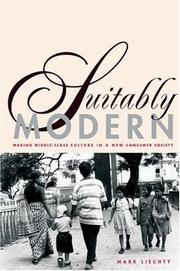| Listing 1 - 2 of 2 |
Sort by
|

ISBN: 0231127332 0231127324 0231508964 9780231508964 9780231127325 9780231127332 Year: 2003 Publisher: New York : Columbia University Press,
Abstract | Keywords | Export | Availability | Bookmark
 Loading...
Loading...Choose an application
- Reference Manager
- EndNote
- RefWorks (Direct export to RefWorks)
Of the thirty-seven million Latinos living in the United States, nearly five million declare themselves to be either Pentecostal or Charismatic, and more convert every day. Latino Pentecostal Identity examines the historical and contemporary rise of Pentecostalism among Latinos, their conversion from other denominations, and the difficulties involved in reconciling conflicts of ethnic and religious identity. The book also looks at how evangelical groups encourage the severing of ethnic ties in favor of spiritual community and the ambivalence Latinos face when their faith fails to protect them from racial discrimination. Latinos are not new to Pentecostalism; indeed, they have been becoming Pentecostal for more than a hundred years. Thus several generations have never belonged to any other faith. Yet, as Arlene M. Sánchez Walsh articulates, the perception of adherents as Catholic converts persists, eliding the reality of a specific Latino Pentecostal population that both participates in the spiritual and material culture of the larger evangelical Christian movement and imprints that movement with its own experiences. Focusing on three groups of Latino Pentecostals/Charismatics-the Assemblies of God, Victory Outreach, and the Vineyard-Sánchez Walsh considers issues such as the commodification of Latino evangelical culture, the Latinization of Pentecostalism, and the ways in which Latino Pentecostals have differentiated themselves from the larger Latino Catholic culture. Extensive fieldwork, surveys, and personal interviews inform her research and show how, in an overwhelmingly Euro-American denomination, diverse Latino faith communities-U.S. Chicano churches, pan-Latin American immigrant churches, and mixed Latin American and U.S. Latino churches-have carved out their own unique religious space.
Hispanic American Pentecostals. --- Pentecôtistes d'origine latino-américaine --- Pentecôtistes d'origine latino-américaine --- Pentecostals, Hispanic American --- Pentecostals --- Latin America --- Pentecostalism --- Evangelicalism --- fiath --- self --- society --- El Aposento Alto --- Latino Pentecostal identity --- God --- youth culture --- the Vineyard --- La Vina --- American Evangelical subculture

ISBN: 0691095922 0691095930 069122174X Year: 2003 Publisher: Princeton University Press
Abstract | Keywords | Export | Availability | Bookmark
 Loading...
Loading...Choose an application
- Reference Manager
- EndNote
- RefWorks (Direct export to RefWorks)
Suitably Modern traces the growth of a new middle class in Kathmandu as urban Nepalis harness the modern cultural resources of mass media and consumer goods to build modern identities and pioneer a new sociocultural space in one of the world's "least developed countries." Since Nepal's "opening" in the 1950s, a new urban population of bureaucrats, service personnel, small business owners, and others have worked to make a space between Kathmandu's old (and still privileged) elites and its large (and growing) urban poor. Mark Liechty looks at the cultural practices of this new middle class, examining such phenomena as cinema and video viewing, popular music, film magazines, local fashion systems, and advertising. He explores three interactive and mutually constitutive ethnographic terrains: a burgeoning local consumer culture, a growing mass-mediated popular imagination, and a recently emerging youth culture. He shows how an array of local cultural narratives--stories of honor, value, prestige, and piety--flow in and around global narratives of "progress," modernity, and consumer fulfillment. Urban Nepalis simultaneously adopt and critique these narrative strands, braiding them into local middle-class cultural life. Building on both Marxian and Weberian understandings of class, this study moves beyond them to describe the lived experience of "middle classness"--how class is actually produced and reproduced in everyday practice. It considers how people speak and act themselves into cultural existence, carving out real and conceptual spaces in which to produce class culture.
Consumption (Economics) --- Middle class --- Kathmandu (Nepal) --- Social conditions. --- Bourgeoisie --- Commons (Social order) --- Middle classes --- Social classes --- Consumer demand --- Consumer spending --- Consumerism --- Spending, Consumer --- Demand (Economic theory) --- Social conditions --- Catmandoo (Nepal) --- Katmandu (Nepal) --- Khatmandu (Nepal) --- Chia-te-man-tu (Nepal) --- Kāṭhamāḍauṃ (Nepal) --- Yem̐ (Nepal) --- Yam̐ (Nepal) --- Yẹn (Nepal) --- Kāṭhamāṇḍau (Nepal) --- Kāntipura (Nepal) --- Kantipur (Nepal) --- KTM (Nepal) --- Appadurai, Arjun. --- Barthes, Roland. --- British colonialism in South Asia. --- Butler, Judith. --- Doordarshan. --- Douglas, Mary. --- Foucault, Michel. --- Fuglesang, Minou. --- Japan. --- Kakar, Sudhir. --- Kett, Joseph. --- Kluge, Alexander. --- Musical Hour. --- Nepali, G. S. --- Rana era. --- Ranas. --- Schein, Louisa. --- Simmel, Georg. --- Sloane, Patricia. --- Somers, Margaret. --- Thapa, Bhim Sen. --- Weber, Max. --- Wilson, Elizabeth. --- code switching. --- consumer society. --- consumption. --- cultivation effect. --- development. --- drugs (illegal). --- education. --- embodiment. --- gender. --- globalization. --- magazines. --- media assemblage. --- media: and imagination. --- modernity. --- nationalism. --- prostitution. --- radio. --- remittance economy. --- sumptuary laws. --- television. --- tourism. --- video. --- youth culture. --- classe moyenne. --- classe moyenne --- Consommation --- Classes moyennes --- Middle class. --- Société de consommation --- Descriptive sociology --- Social history --- History --- Sociology --- societe de consommation --- Katmandou (Nepal) --- Nepal --- Nepal. --- Katmandou (Népal) --- Nīpāl --- Ni-po-erh --- Nepāḥ --- Nepal Adhirajya --- Kingdom of Nepal --- Nepāla --- Federal Democratic Republic of Nepal --- Sanghiya Loktāntrik Ganatantra Nepāl --- Непал --- Savezna Demokratska Republika Nepal --- República Federal Democràtica del Nepal --- Kongeriget Nepal --- Demokratische Bundesrepublik Nepal --- Νεπάλ --- Nepalo --- Federacia Demokratia Respubliko Nepalo --- República Federal Democrática de Nepal --- Nepali Demokraatlik Liitvabariik --- Nepalgo Errepublika Demokratiko Federala --- Nepalin demokraattinen liittotasavalta --- République démocratique fédérale du Népal --- נפאל --- Sambandslýðveldið Nepal --- ネパール --- Nepāru --- 네팔 --- Nepalia --- Federale Democratische Republiek Nepal --- Nepālas Federālā Demokrātiskā Republika --- Федеративная Демократическая Республика Непал --- Federativnai︠a︡ Demokraticheskai︠a︡ Respublika Nepal --- Савезна Демократска Република Непал --- Республіка Непал --- Respublika Nepal --- Федеративна Демократична Республіка Непал --- Federatyvna Demokratychna Respublika Nepal --- Cộng hòa dân chủ liên bang Nepal --- 尼泊尔 --- Nibo'er --- Conditions sociales. --- Classe moyenne --- Petite bourgeoisie --- Hommes des classes moyennes --- Femmes des classes moyennes --- Classes sociales --- Consommation (économie politique) --- Consommation (théorie économique) --- Dépenses de consommation --- Consommation de tabac --- Consommateurs --- Consommation collaborative --- Cyberconsommation --- Consommation durable --- Abondance (économie politique) --- Coopératives de consommation --- Crédit à la consommation --- Impôt sur la consommation --- Indice des prix à la consommation --- Pouvoir d'achat --- Prix --- Rationnement --- Société de consommation --- Demande (économie politique) --- Comportement --- Federativnai͡a Demokraticheskai͡a Respublika Nepal --- Nepā --- Kātmāndu (Népal) --- Kathmandou (Népal) --- Kathmandu (Népal) --- Kāṭhamāṃḍū (Népal) --- काठमांडू (Népal) --- Kāṭhamāḍauṃ (Népal) --- काठमाडौं (Népal) --- Kāṭhmāḍaṃ (Népal) --- काठ्माडौं (Népal) --- Kāntipura (Népal) --- कन्तिपुर (Népal) --- Kantipur (Népal) --- Kāntipura nagara (Népal) --- कान्तिपुर नगर (Népal) --- Yeṃdey (Népal) --- येंदेय् (Népal) --- Théorie de la culture de consommation --- Attitude
| Listing 1 - 2 of 2 |
Sort by
|

 Search
Search Feedback
Feedback About UniCat
About UniCat  Help
Help News
News